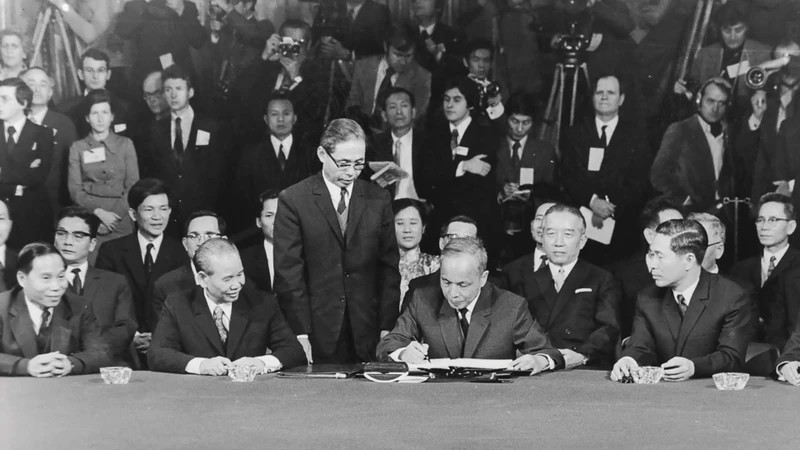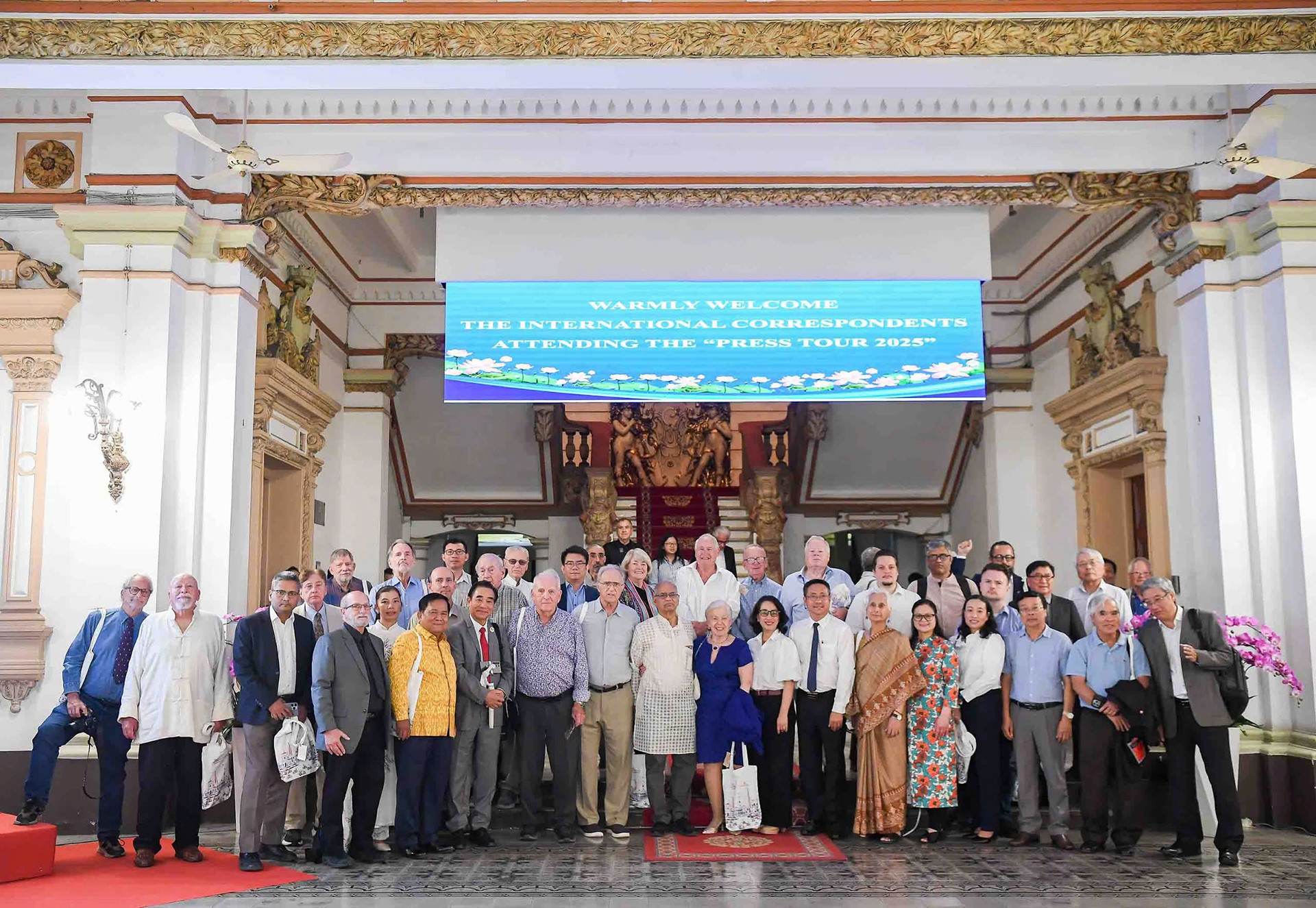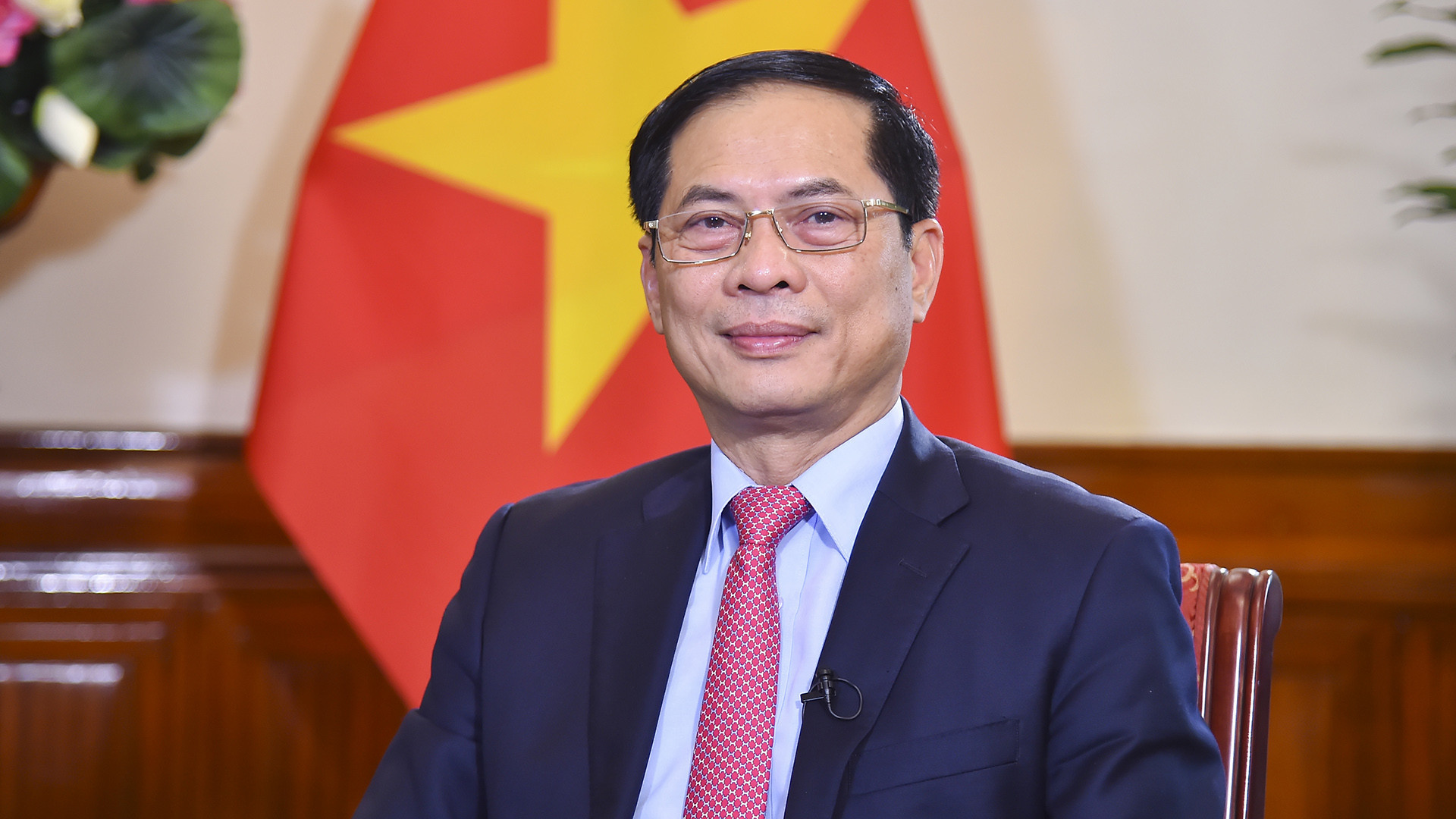Fifty years ago, the great victory of the Spring Offensive in 1975 marked the end of a protracted resistance war, leading to the complete liberation of the South and reunification of the nation. This momentous achievement stands as a glorious chapter in the history of Vietnam’s defense and nation-building.
As acknowledged at the Fourth National Party Congress in 1976, “The victory of the Vietnamese people in the cause of liberating the South and reunifying the country shall forever be inscribed in the nation's history as one of the most brilliant pages and a shining symbol of revolutionary heroism and human intellect, ranking among the greatest feats of the 20th century.”
Vietnamese diplomacy is honored and proud to have contributed to this monumental national triumph. Over the past 80 years, our history shows that every great victory on the battlefield was closely linked with decisive successes at the negotiation table. Just as the historic triumph at Dien Bien Phu paved the way for results at the Geneva Conference, the breakthroughs of the Paris Peace Accords played a vital role in the victory of the 1975 Spring Offensive. The diplomatic victories of that period left behind invaluable lessons that remain relevant to this day.
Diplomacy as a strategic front

Deputy Prime Minister and Minister of Foreign Affairs Nguyen Duy Trinh, representing the government of the Democratic Republic of Vietnam, signs the Paris Peace Accords. (Source: VNA)
During the resistance war against the United States, heeding President Ho Chi Minh’s sacred mandate that “no matter how difficult and arduous, our people shall certainly win; our homeland shall be united, and our compatriots in the North and South shall be reunited,” the top priority for national interest was the liberation of the South and reunification of the country.
Confronting a vastly superior adversary, our Party emphasized the need to forge comprehensive strength by combining national unity with the prevailing trends of the era. This included the solidarity of the Vietnamese people from North to South, the alliance with Laos and Cambodia, support from socialist nations - especially the Soviet Union and China - and backing from progressive forces worldwide. The 13th Plenum of the Party Central Committee in 1967 declared, “Diplomatic struggle not only reflects the battlefield conflict but, in today’s international context, carries a critical, proactive role.” In 1969, the Politburo affirmed that “diplomacy becomes a strategic front of great significance.”
Diplomacy worked in concert with military and political efforts to implement the dual approach of “fighting and negotiating,” leveraging national strength. Military and political struggles laid the groundwork for diplomatic negotiations, while diplomatic efforts amplified military and political victories. Through flexible and skillful strategies, we compelled the United States to enter negotiations in 1969, opening a path to phased victories. Intense intellectual battles at the negotiation table with one of the world’s leading powers sharpened the resolve and ingenuity of Vietnam’s revolutionary diplomacy. Eminent diplomats such as Le Duc Tho, Xuan Thuy, and Nguyen Thi Binh became enduring symbols of Vietnam’s firm yet tactful diplomatic spirit.
This strategic “fight-talk” duality culminated in the signing of the Paris Peace Accords. Alongside military victories at Khe Sanh and during the Tet Offensive, diplomatic achievements forced the United States to de-escalate and sign the January 1973 agreement, achieving the goal of “driving out the Americans” and setting the stage for “toppling the puppet regime.” Under the agreement, the U.S. was required to withdraw all troops and weapons from southern Vietnam, enabling revolutionary forces to consolidate strength. This shift in battlefield dynamics paved the way for the final campaign. As the Politburo stated in 1974, “Beyond this moment, there will be no other opportunity” to completely liberate the South and reunify the country.
Diplomacy also galvanized support from the three great revolutionary currents of the time, harnessing solidarity from socialist nations and a broad international coalition supporting Vietnam’s just cause. President Fidel Castro’s iconic statement, “For Vietnam, the Cuban people are ready to shed their blood,” epitomized the fraternal socialist countries’ material and moral support. Along with our own determination, this backing was instrumental in achieving battlefield victories. President Ho Chi Minh and other early leaders used their international stature to rally support and strengthen socialist alliances - even amid tensions and differences - positioning the Vietnamese revolution as a unifying force. In solidarity with Laos and Cambodia, Vietnam nurtured mutual cooperation and contributed to the revolutionary success of all three nations.

Ho Chi Minh City officials meet with former war correspondents who covered the Vietnam conflict and foreign journalists who supported Vietnam’s resistance. Photo: Minh Nhat
Vietnamese “hearts and minds” diplomacy won global support through righteousness and moral clarity. The name “Vietnam” became a beacon of the global liberation movement, even inspiring segments of American society and prominent global intellectuals. Millions worldwide, including U.S. citizens, marched against the war, volunteered to aid Vietnam, donated blood, and raised funds. The image of Swedish Prime Minister Olof Palme protesting and American pacifist Norman Morrison self-immolating became lasting symbols of peace and justice.
In a spirit of “reconciliation,” diplomacy also laid the foundation for healing with former adversaries. Even amidst war, we expressed our desire for friendship, including with the United States, and offered them a dignified withdrawal. Gestures such as humane treatment and repatriation of prisoners of war, along with facilitating civilian evacuations, embodied a humanitarian and peaceful diplomatic stance that would later aid in normalizing relations.
Alongside our just struggle, diplomacy carried forward President Ho Chi Minh’s vision of “making more friends and fewer enemies,” helping expand Vietnam’s foreign relations beyond socialist and newly independent countries. After the Paris Agreement, Vietnam swiftly established diplomatic ties with Western capitalist powers such as Japan, the UK, France, Italy, Canada, Belgium, and the Netherlands, achieving broader international recognition for the Democratic Republic of Vietnam.
As President Ho Chi Minh emphasized, “To succeed, one must anticipate events.” Strategic research and forecasting in diplomacy greatly supported political and military fronts. Our foreign service accurately assessed global conditions, allies’ interests, and rivals’ intentions, enabling the Party to make timely decisions at critical junctures. During the war, alongside military offensives, diplomatic efforts pressured the U.S. into halting bombings and eventually accepting negotiations.
Throughout history, strategic foresight has proven as vital as any army corps. In major campaigns like the Tet Offensive and the historic Ho Chi Minh Campaign, diplomatic intelligence correctly evaluated enemy weaknesses, particularly the fragility of the Saigon regime and Washington’s political direction. This enabled us to predict with confidence that the U.S. would not re-intervene militarily in 1975.
Timeless lessons for a rising era

Vietnam’s nascent diplomatic service, forged during nine years of resistance against France and matured through two decades of war with the U.S., achieved legendary triumphs at Geneva (1954) and Paris (1973). These moments distilled collective wisdom and resilience during the most arduous chapters of our revolutionary history. Tested in times of existential national peril, the lessons learned remain profoundly relevant to Vietnam’s current development.
Today’s epochal changes demand revolutionary decisions. As General Secretary To Lam declared, “In this new era of national ascent, Vietnamese diplomacy must rise to new heights, fulfill new glorious missions, and be worthy of its role as a vanguard and integral arm of the Vietnamese revolution.” Embodying this vision, our diplomacy will continue applying timeless lessons from the struggle for liberation and reunification as we enter a new era.
Foremost is the enduring principle of safeguarding national interests. During the war, diplomacy consistently embodied President Ho Chi Minh’s 1964 message that foreign service “must always serve national interests.” Today, national interest remains the compass for action, guiding cooperation and resistance alike. In an interdependent world, protecting these interests requires equality, cooperation, mutual benefit, and a commitment to peace, sovereignty, democracy, and global progress - anchored in the UN Charter and international law.
Equally vital is the lesson of combining internal and external strength, uniting national will with global currents. In the past, “hearts and minds” diplomacy won massive global material and moral support. Today, “development diplomacy” must harness favorable external forces such as the global trends of peace, multipolarity, equity, and sustainability. We must seize new economic opportunities - green economy, digital economy, circular economy - and technological breakthroughs like AI and semiconductors. Diplomacy must lead in unlocking cooperation with leading countries and corporations, tapping into capital, knowledge, and innovation hubs, and elevating Vietnam’s role in global supply chains.
Diplomacy now plays a “core, regular, and pioneering” role in protecting national interests. In wartime, our Party designated diplomacy as a battlefield alongside politics and the military. Today, amid rapid global shifts and intensifying rivalries, diplomacy must act preemptively to secure sovereignty and stability. It must deepen strategic partnerships, open new avenues for national security and growth, and position Vietnam in a favorable international landscape.
Lastly, the lesson of global integration remains essential. Previously, integration aligned our nation with the global revolutionary currents and socialist bloc. Today, it entails comprehensive international engagement that drives national development. Implementing Resolution 59 on international integration, alongside Resolutions 18 and 57 on institutional reform and digital transformation, forms the strategic trio guiding our revolutionary phase. Integration must become a shared civic culture - embraced by every citizen, business, and locality - as both the driving force and beneficiary of Vietnam’s global journey.
Inheriting a proud legacy, Vietnam’s diplomacy has created a dynamic and expansive global presence to protect and build the nation. We now maintain diplomatic relations with 194 countries and strategic or comprehensive partnerships with 34 of them, actively engaging in over 70 international organizations. We have moved from economic integration to deep, wide-ranging global engagement - playing a central, guiding role in strategic mechanisms and making meaningful contributions to solving global challenges.
Every major victory in our history bears the mark of diplomacy. During the struggle for liberation, it was a front that led to the historic triumph of Spring 1975. During the era of renewal, it broke the blockade and opened the doors to international integration. Its timeless vision and enduring lessons will continue to illuminate our path as Vietnam advances toward a prosperous future. Diplomacy remains steadfast in its mission to serve the nation, serve the people, and protect our highest national interests.
Bui Thanh Son
Member of the Party Central Committee, Deputy Prime Minister, and Minister of Foreign Affairs